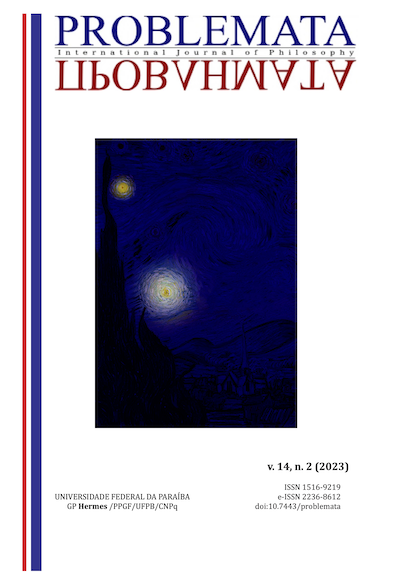KNOWLEDGE IN POPULAR ART:
REFLECTIONS ON THE PARAIBAN COCO DE RODA FROM THE SABERES EM RODA PROJECT
DOI:
https://doi.org/10.7443/problemata.v14i2.67881Keywords:
Popular art, Coco de Roda, Popular Knowledge, Aesthetic ExperienceAbstract
The purpose of this work was to investigate the experience of the coco de roda from Paraíba: a popular dance, which is understood by those who experience it as a game or play (brincadeira). The article intends to think about the constituent elements and learning possibilities of this cultural and artistic manifestation. The reflection was based on the virtual coexistence established with the teacher Ana do Coco, from the Coco de Roda Novo Quilombo group (Ipiranga and Guruji quilombos - Conde/PB), in the extension project Saberes em Roda, integrated to the discipline Metodologia da Música III. Furthermore, the experience of transmitting this knowledge and the virtuality of encounters imposed by the pandemic reveal interesting questions: popular traditions have their strength as a dynamic event and creation, and not as historical (chronological), calculated and informative knowledge. Thus, in order to understand the aesthetic meaning and learning of coco de roda, it is necessary to enter in the dimension of “knowledge of experience” (BONDÍA, 2002), the scope in which experience drives the movement that establishes the knowledge of a people in the world: experience is knowledge.
Downloads
References
ANDRADE, Mário de. Os cocos. Prep., introd. e notas de Oneyda Alvarenga. São Paulo: Duas Cidades; Brasília: INL/Fundação Pró-Memória, 1984.
BONDÍA, Jorge Larrosa. Notas sobre a experiência e o saber de experiência. Revista Brasileira de Educação, n. 19, p. 20-28, jan./fev./mar./abr., 2002.
DO COCO, Mestra Ana. [Os elementos tradicionais do Coco de Roda Novo Quilombo]. WhatsApp: 13. fev. 2021. 10:30. 1 Mensagem de WhatsApp.
DO COCO, Mestra Ana. Documentário Protagonismo Feminino na cultura popular da Paraíba. In: DO COCO, Mestra Ana. Documentário Protagonismo Feminino na cultura popular da Paraíba. João Pessoa: Jaqueline Lima, 2020. Disponível em: https://www.youtube.com/watch?v=Uj9vfuMjkAM&ab_channel=JaquelineLima. Acesso em: 26 ago. 2021.
DO COCO, Mestra Ana; SILVA, Zé. Negro racha os pés de tanto sapatear: Coco, uma história de vida. Claves. João Pessoa. v.9, n. 14, p. 201-218, 2021. Disponível em: https://periodicos.ufpb.br/index.php/claves/article/view/57554. Acesso em: 26 ago. 2021.
ELIAS, Mestre. [Características do coco baianado e martelado]. WhatsApp: 13. fev. 2021. 10:30. 1 Mensagem de WhatsApp.
GRAEFF, Nina. Os ritmos da roda: Tradição e transformação no samba de roda. Salvador: EDUFBA, 2015.
HAMPATÉ BÂ A. A tradição viva. In: KIZERBO, J. História Geral da África Metodologia e pré-história. São Paulo: Ática, Paris: UNESCO, 1982.
QUEIROZ, L. R. S. Educação musical como cultura: nuances para interpretar e (re)pensar o ensino de música no século XXI. DEBATES: Cadernos do Programa de Pós-Graduação em Música, [S. l.], n. 18, 2017. Disponível em: http://www.seer.unirio.br/revistadebates/article/view/6524. Acesso em: 2 ago. 2021.
SANTANA, Chico. Batucada: experiência em movimento. Tese (doutorado em música). Universidade Estadual de Campinas, Instituto de Artes, Campinas SP, 2018.
SANTOS, Milton. Por uma outra globalização: do pensamento único à consciência universal. Rio de Janeiro: Record, 2006.
Downloads
Published
Issue
Section
License
Copyright (c) 2023 Polyanni Dallara Dantas Oliveira

This work is licensed under a Creative Commons Attribution 4.0 International License.
Authors who publish with this journal agree to the following terms:
- Authors retain copyright and grant the journal right of first publication with the work simultaneously licensed under a Creative Commons Attribution License that allows others to share the work with an acknowledgement of the work's authorship and initial publication in this journal.
- Authors are able to enter into separate, additional contractual arrangements for the non-exclusive distribution of the journal's published version of the work (e.g., post it to an institutional repository or publish it in a book), with an acknowledgement of its initial publication in this journal.
-
- Authors are permitted and encouraged to post their work online (e.g., in institutional repositories or on their website) prior to and during the submission process, as it can lead to productive exchanges, as well as earlier and greater citation of published work (See The Effect of Open Access).





